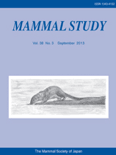
MAMMAL STUDY
Scope & Guideline
Fostering insights into the intricate lives of mammals.
Introduction
Aims and Scopes
- Ecological and Behavioral Studies:
Research focusing on the ecological roles and behavioral patterns of mammals in diverse environments, including interactions within ecosystems and responses to environmental changes. - Genetic and Molecular Research:
Investigations into the genetic diversity, phylogeography, and molecular biology of mammalian species, providing insights into evolutionary processes and population dynamics. - Conservation and Management:
Studies aimed at understanding the impact of human activities on mammalian populations and habitats, emphasizing strategies for effective conservation and management of species. - Morphology and Physiology:
Research examining the anatomical and physiological aspects of mammals, including adaptations to their environments and implications for behavior and survival. - Human-Wildlife Interactions:
Exploration of the relationships between mammals and human populations, including conflicts, adaptations, and the implications for wildlife management.
Trending and Emerging
- Urban Ecology and Adaptation:
There is an increasing emphasis on how mammals adapt to urban environments, including studies on behavior, dietary shifts, and habitat use in urbanized landscapes. - Climate Change Impact Studies:
Research exploring the effects of climate change on mammalian populations and ecosystems is gaining traction, focusing on species responses, habitat alterations, and conservation strategies. - Non-Invasive Research Techniques:
The rise of non-invasive methods for studying mammals, such as genetic sampling from feces or environmental DNA, is becoming more prevalent, allowing for more ethical and less intrusive data collection. - Community Ecology and Interactions:
An emerging focus on community interactions among mammals, including competition, predation, and symbiotic relationships, is being highlighted in recent studies, providing a broader ecological perspective. - Conservation Genetics:
Research that combines genetics with conservation efforts is trending, emphasizing the importance of genetic diversity for the survival of endangered species and the effectiveness of management practices.
Declining or Waning
- Traditional Taxonomy:
Research centered around classical taxonomy and systematic classification of mammals appears to be decreasing, possibly due to the increasing focus on molecular techniques and genetic analyses. - In-depth Species-Specific Studies:
The prevalence of studies focusing solely on individual species without broader ecological or conservation context is waning, as there is a shift toward integrative approaches that consider multiple species and their interactions. - Laboratory-Based Mammalogy:
Research conducted primarily in controlled laboratory settings is becoming less common, with a growing emphasis on field studies that examine species in their natural habitats. - Historical Ecology:
The focus on historical ecological studies examining past mammalian populations and environments is declining, potentially overshadowed by urgent contemporary conservation and ecological issues.
Similar Journals
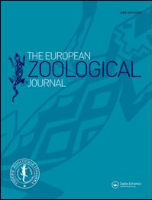
European Zoological Journal
Exploring the Wonders of ZoologyEuropean Zoological Journal, published by Taylor & Francis Ltd, is an esteemed open-access publication dedicated to advancing the exciting field of zoology. Since its inception in 2017, this journal has progressively established itself as a vital resource for researchers, professionals, and students alike. With its Q2 ranking in Animal Science and Zoology as of 2023, the journal ranks in the 69th percentile among its peers, showcasing its influence and contribution to the discipline. The journal’s broad scope covers a wide range of topics within zoology, aiming to foster an understanding of animal biology and conservation efforts. As an open-access journal, it not only enhances the dissemination of knowledge but also encourages collaborative research across global communities. Situated in the United Kingdom, the European Zoological Journal invites submissions that contribute to the evolving discourse in animal sciences, and endeavors to support the scientific community in addressing pressing ecological challenges.
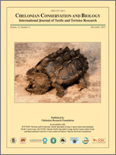
CHELONIAN CONSERVATION AND BIOLOGY
Empowering research to protect our shelled companions.Chelonian Conservation and Biology is a distinguished academic journal dedicated to advancing the field of chelonian research, encompassing conservation, ecology, and biology of turtles and tortoises. Published by Allen Press Inc in the United States, this journal is well-regarded within the realm of Animal Science and Zoology, as well as Ecology, Evolution, Behavior and Systematics, holding a commendable Q3 ranking in both categories for 2023. With an ISSN of 1071-8443 and an E-ISSN of 1943-3956, the journal features a diverse range of articles aimed at professionals, researchers, and students, fostering an understanding of the critical challenges facing chelonians worldwide. Although not an open-access publication, Chelonian Conservation and Biology provides high-quality content, including original research, reviews, and case studies, encouraging engagement and collaboration among experts. With coverage extending from 2006 to 2024, the journal serves as a vital platform for disseminating knowledge and promoting conservation efforts essential to the survival of these remarkable species.
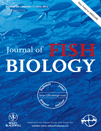
JOURNAL OF FISH BIOLOGY
Innovating Understanding of Aquatic EcosystemsJOURNAL OF FISH BIOLOGY, published by Wiley in the United Kingdom, is a distinguished peer-reviewed journal dedicated to advancing the understanding of the biology and relationships of fishes. With a robust history from its inception in 1969 to its future publications extending into 2024, the journal occupies a pivotal position in the academic landscape of aquatic sciences and ecology. Holding a notable Impact Factor and recognized within the second quartile (Q2) for both Aquatic Science and Ecology, Evolution, Behavior and Systematics, it serves as an essential resource for researchers, professionals, and students alike. The journal’s contributors delve into diverse topics ranging from evolutionary biology to conservation strategies, fostering a dynamic interchange of knowledge and innovation within the fish biology community. Access options are currently via subscription, ensuring high-quality, curated content that reflects the latest empirical research and theoretical advancements in the field.
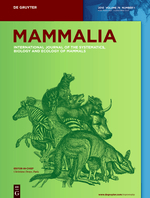
MAMMALIA
Elevating the discourse in zoological research.MAMMALIA, published by Walter de Gruyter GmbH, is a renowned academic journal founded in 1936 that serves as a pivotal resource for researchers and professionals in the fields of Animal Science and Zoology as well as Ecology, Evolution, Behavior and Systematics. With an ISSN of 0025-1461 and an E-ISSN of 1864-1547, this journal has made significant contributions to mammalian research over the decades and continues to be pivotal in advancing knowledge within the scientific community. MAMMALIA is indexed in prominent databases, boasting a current Scopus ranking that places it within the upper echelons of the Q2 category in Animal Science and Zoology, and Q3 in Ecology, Evolution, Behavior and Systematics. Although it does not offer open access, the journal remains accessible through various academic institutions, ensuring that valuable research findings are disseminated widely. The journal’s commitment to quality and excellence in the study of mammals aligns with its high impact within the field, engaging a diverse readership that includes researchers, students, and professionals dedicated to furthering the understanding of mammalian biology. For more information, visit their office located at Genthiner Strasse 13, D-10785 Berlin, Germany.

HYSTRIX-Italian Journal of Mammalogy
Advancing Mammalian Research for a Sustainable FutureHYSTRIX-Italian Journal of Mammalogy, published by the Associazione Teriologica Italiana, is a prestigious open access journal that has been at the forefront of mammalogy research since 1986. With an ISSN of 0394-1914 and an E-ISSN of 1825-5272, this journal is uniquely positioned in the realms of Animal Science, Zoology, and Ecology, as reflected in its Q2 and Q3 quartile rankings for the year 2023. Based in Italy, it serves as a prominent platform for the dissemination of groundbreaking research and studies, striving to foster a deeper understanding of mammalian biology and conservation. The journal's commitment to open access ensures that knowledge is readily available to researchers and students worldwide, bolstering the global academic community. With a dedicated editorial team, HYSTRIX invites contributions that cover a wide array of topics encompassing ecological evolution, behavior, and systematics of mammals, driving forward the discourse in these vital fields.
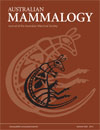
AUSTRALIAN MAMMALOGY
Exploring Australia's Unique Mammals and Their Ecological DynamicsAustralian Mammalogy, published by CSIRO PUBLISHING, is a pivotal journal in the fields of Animal Science and Zoology as well as Ecology, Evolution, Behavior and Systematics. With its ISSN 0310-0049 and E-ISSN 1836-7402, this esteemed journal has been instrumental in disseminating critical research findings since 2000, and continues to evolve up to 2024. Ranked in the Q2 quartile of both its categories for 2023, it showcases a diverse array of studies that contribute to understanding Australia’s unique mammalian fauna and its ecological dynamics. Researchers, professionals, and students will find valuable insights in its peer-reviewed articles, which are essential for advancing knowledge in these essential scientific disciplines. Located in Australia at UNIPARK, Locked Bag 10, Clayton, VIC, this journal remains committed to fostering scholarly communication within the global scientific community.

JOURNAL OF CONCHOLOGY
Advancing the Science of MollusksJOURNAL OF CONCHOLOGY, published by the Conchological Society of Great Britain & Ireland, is a prominent academic journal focused on the study of mollusks, specifically their taxonomy, ecology, and evolutionary biology. Through its rigorous peer-review process, it aims to provide a platform for significant research in the field, fostering deeper understanding and appreciation of these diverse organisms. Although it is not currently an Open Access journal, its publications contribute notably to the fields of Agricultural and Biological Sciences, notably in Ecology, Evolution, Behavior and Systematics and Aquatic Science, as indicated by its rankings in Scopus. The journal's archives trace comprehensive coverage from 1981 to 1990 and from 1996 to 2018. With its commitment to advancing conchological knowledge, the JOURNAL OF CONCHOLOGY serves as a crucial resource for researchers, professionals, and students invested in the biological and ecological dimensions of mollusk studies.
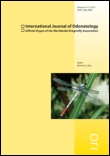
INTERNATIONAL JOURNAL OF ODONATOLOGY
Fostering Knowledge in Insect Behavior and EcologyINTERNATIONAL JOURNAL OF ODONATOLOGY, published by Wachholtz Verlag GmbH, is a vital resource for researchers and professionals in the fields of Ecology, Evolution, Behavior, and Insect Science. Established in 1998, this journal provides a platform for the dissemination of innovative research pertaining to odonatology, encompassing the ecological and biological interactions of dragonflies and damselflies. With its focus on advancing knowledge within these scientific disciplines, the journal holds a commendable Q3 ranking in Ecology, Evolution, Behavior and Systematics and a Q2 ranking in Insect Science for 2023, reflecting its significance in academic circles. Although it operates without open access, its articles are accessible through institutional subscriptions, allowing for wide dissemination among scholars and practitioners. The journal's commitment to publishing high-quality, peer-reviewed research makes it an authoritative source of information that enriches the study of odonates and their broader ecological contexts. For inquiries, the journal's editorial team can be reached at C/O Fleet7, Fleethorn 7, Kiel 24103, Germany.

JOURNAL OF ORNITHOLOGY
Documenting the Diversity of Bird SpeciesJOURNAL OF ORNITHOLOGY, published by Springer Heidelberg, is a leading international journal dedicated to the study of birds and their conservation. With an ISSN of 2193-7192 and an E-ISSN of 2193-7206, this journal serves as a crucial platform for disseminating innovative research focused on avian biology, ecology, and behavior, making significant contributions to the fields of Agricultural and Biological Sciences and Animal Science and Zoology, where it holds a commendable rank of #156 out of 490 in Scopus. Established from 2004 and continuing through 2024, the journal strives not only to advance academic scholarship but also to inform practical conservation efforts globally. While currently not open access, it remains a vital resource for researchers, professionals, and students seeking high-quality studies and findings that influence the understanding and preservation of bird species. The journal's commitment to excellence in science highlights its importance in ornithological research, offering insights that are both profound and actionable.

PLANT SPECIES BIOLOGY
Fostering Interdisciplinary Dialogue in Plant SciencePLANT SPECIES BIOLOGY, published by WILEY in the United Kingdom, is a prominent journal dedicated to advancing the understanding of plant species, their biology, ecology, and roles within ecosystems. With an impressive convergence of research dating back to 1986 and extending through 2024, this journal caters specifically to specialists in the fields of plant science and ecology. The journal's current impact factor further underscores its significance, ranking in the Q2 quartile across three relevant categories: Ecology, Ecology, Evolution, Behavior and Systematics, and Plant Science. As a member of the Scopus ranks, it holds respectable positions within its categories, evidencing its contribution to impactful scientific discussions and knowledge. Although it is not an open-access journal, PLANT SPECIES BIOLOGY provides essential insights, fostering interdisciplinary dialogue and discovery for researchers, professionals, and students dedicated to exploring the complexities of plant species and their ecosystems.